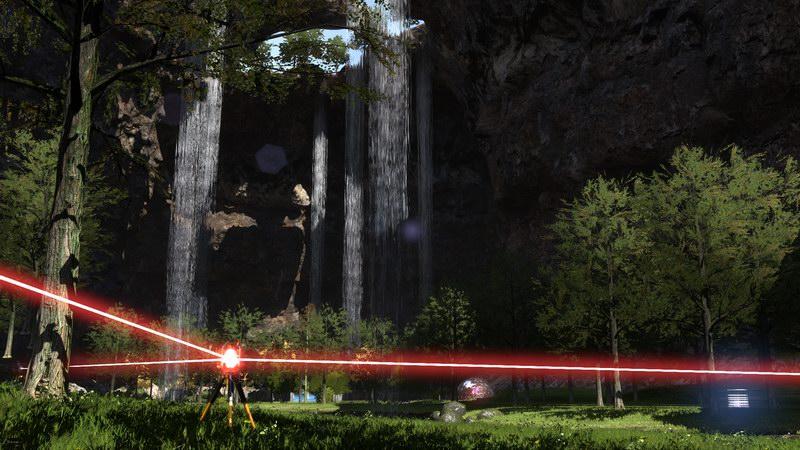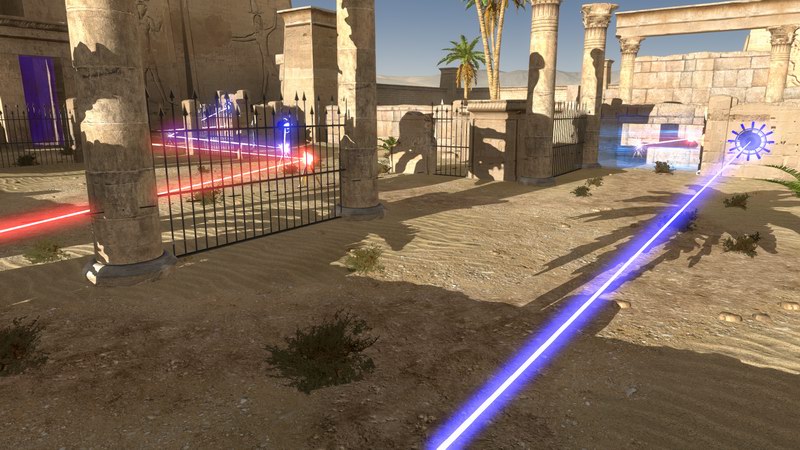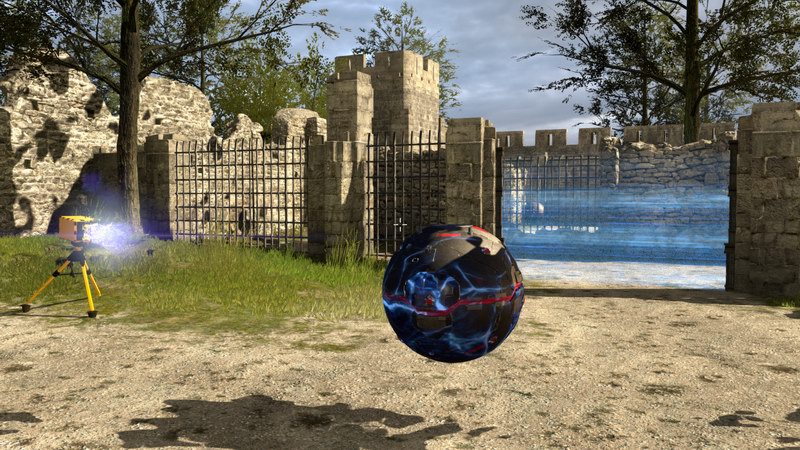The Talos Principle | reviews, news & interviews
The Talos Principle
The Talos Principle
Simple mechanics lead to complex puzzles and philosophical musings…

Simple to play, fiendish to beat and with a huge depth of theme and beauty, The Talos Principle is a massively welcome end of year surprise. Like Portal and the recent The Swapper (whose writer also is involved here) this deftly blends a series of (120+) puzzles of growing complexity and ingenuity, that arise out of a very simple and brief set of mechanics, into a rich and deep philosophical theme.
Awakening amidst what appears to be the gathered together ruins of the most beautiful bits of human civilisation and history, you're a robot(?) that is told to solve puzzles by a booming voice in the sky that calls itself Elohim. Quite why you're solving puzzles is initially unclear, as is why you're told not to go anywhere near the gigantic tower up into the heavens on pain of death, or even what you are.
Instead, as you solve puzzles, you'll find strange terminals dotted about the place, filled with stories of Greek myth, emails from scientists in a world at the edge of Armageddon, and, just perhaps, a chance to talk to someone else – someone who is telling you a decidedly different story to the voice in the clouds.
 Reading between these lines, in the conflicting and partial voices, you'll start to discern a narrative – but one that asks far more powerful questions than it answers: what are "you"? Who is God? Is consciousness something that is tied to humanity, a "soul", insubstantial, or is it a network, or an emergent behaviour, or something else entirely? Can consciousness be transferred? And, just perhaps, what the hell is the point of "us" anyway?
Reading between these lines, in the conflicting and partial voices, you'll start to discern a narrative – but one that asks far more powerful questions than it answers: what are "you"? Who is God? Is consciousness something that is tied to humanity, a "soul", insubstantial, or is it a network, or an emergent behaviour, or something else entirely? Can consciousness be transferred? And, just perhaps, what the hell is the point of "us" anyway?
Underneath that narrative, there's the actual business of solving puzzles and unlocking new bits of gorgeous ruins, in order to solve new puzzles. This is not entirely successfully woven into the narrative. Rather, the two sit awkwardly alongside each other barely acknowledging the other's existence. And it's entirely possible to play the game without engaging with the philosophical stuff – although you'd be missing out to do so.
 Thankfully, however you play, the puzzles are superb. They build from really simple ideas (use a gizmo to make a door open, direct a beam of light to a switch etc.), so simple they never need an explanation or instructions. But despite using very simple stock mechanics, rapidly across the beautifully-designed and beautiful-looking levels, the puzzles get fiendish.
Thankfully, however you play, the puzzles are superb. They build from really simple ideas (use a gizmo to make a door open, direct a beam of light to a switch etc.), so simple they never need an explanation or instructions. But despite using very simple stock mechanics, rapidly across the beautifully-designed and beautiful-looking levels, the puzzles get fiendish.
The way the game is structured it's easy to leave a tough level and come back to it later – possibly having learnt new ways to get round something. And often level solutions for old levels popped into my head while on the train. There are also fairly pointless "hint" options – enabled too late and involving some pretty hard puzzle-solving to even gain access. But walkthroughs will be widely found online soon anyway.
A feast for the eyes and mind, The Talos Principle is one of a spate of recent puzzle games that are designed to test not just your problem-solving processors, but other parts of your brain too. A lovely way to see out the year.
- The Talos Principle is out now for Linux, Mac, PC. Developed by Croteam and published by Devolver Digital.
- Read other gaming reviews on theartsdesk
- Simon Munk on Twitter
The future of Arts Journalism
You can stop theartsdesk.com closing!
We urgently need financing to survive. Our fundraising drive has thus far raised £49,000 but we need to reach £100,000 or we will be forced to close. Please contribute here: https://gofund.me/c3f6033d
And if you can forward this information to anyone who might assist, we’d be grateful.

Subscribe to theartsdesk.com
Thank you for continuing to read our work on theartsdesk.com. For unlimited access to every article in its entirety, including our archive of more than 15,000 pieces, we're asking for £5 per month or £40 per year. We feel it's a very good deal, and hope you do too.
To take a subscription now simply click here.
And if you're looking for that extra gift for a friend or family member, why not treat them to a theartsdesk.com gift subscription?
more Gaming
 'We are bowled over!' Thank you for your messages of love and support
Much-appreciated words of commendation from readers and the cultural community
'We are bowled over!' Thank you for your messages of love and support
Much-appreciated words of commendation from readers and the cultural community
 Kelly Clancy: Playing with Reality - How Games Shape Our World review - how far games go back
The acclaimed neuroscientist on the world and history of games, in all their variety
Kelly Clancy: Playing with Reality - How Games Shape Our World review - how far games go back
The acclaimed neuroscientist on the world and history of games, in all their variety
 Rage 2 review – garish but great post-apocalyptic shooter
Challenge The Authority in this 'Mad Max on mushrooms' renegade romp
Rage 2 review – garish but great post-apocalyptic shooter
Challenge The Authority in this 'Mad Max on mushrooms' renegade romp
 World War Z review - bloodthirsty fun with the zombie apocalypse
Chainsawing the brain-eaters as you battle against the tide of the undead
World War Z review - bloodthirsty fun with the zombie apocalypse
Chainsawing the brain-eaters as you battle against the tide of the undead
 The Lego Movie 2 Videogame review - everything is not awesome
Few fresh ideas means this movie adaptation treads the same old ground
The Lego Movie 2 Videogame review - everything is not awesome
Few fresh ideas means this movie adaptation treads the same old ground
 Anthem review - singing praises? More like a cautious nod
A rocky start for a new franchise that offers potential and problems in equal measure
Anthem review - singing praises? More like a cautious nod
A rocky start for a new franchise that offers potential and problems in equal measure
 Crackdown 3 review - spectacular super-powered action that was great fun many years ago
Nearly a decade has passed since the last incarnation but little has changed in this stagnant shooter
Crackdown 3 review - spectacular super-powered action that was great fun many years ago
Nearly a decade has passed since the last incarnation but little has changed in this stagnant shooter
 Battlefield V review - WWII on an epic scale
The veteran series returns for another ambitious tour of duty
Battlefield V review - WWII on an epic scale
The veteran series returns for another ambitious tour of duty
 Fallout 76 review - how to wreck a perfectly good legacy with one messy game
When home runs go horribly wrong
Fallout 76 review - how to wreck a perfectly good legacy with one messy game
When home runs go horribly wrong
 Red Dead Redemption 2 review - the cowboy drama makes a triumphant return
An ambitious Wild West odyssey that matches epic scale with benchmark skill
Red Dead Redemption 2 review - the cowboy drama makes a triumphant return
An ambitious Wild West odyssey that matches epic scale with benchmark skill
 Call of Duty: Black Ops 4 review – less is more
Solo rations have been relegated from this benchmark war series
Call of Duty: Black Ops 4 review – less is more
Solo rations have been relegated from this benchmark war series
 FIFA 19 review - the best just got a bit better
It looks and plays great, but what’s new?
FIFA 19 review - the best just got a bit better
It looks and plays great, but what’s new?

Add comment